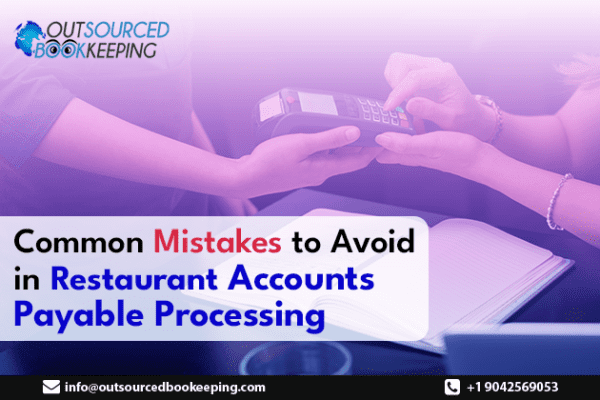The management of a restaurant’s financials is incomplete without the incorporation of the pivotal restaurant accounts payable processing. Proper handling of accounts payable guarantees timely payment to suppliers and vendors, resulting in the seamless operation of a restaurant.

Nevertheless, the processing of accounts payable can be intricate and susceptible to mistakes. This article delves into avoiding typical errors in the handling of restaurants’ accounts payable processing, promoting a smooth and precise workflow.
-
Failing to keep proper documentation:
A prevalent error in the management of accounts payable is the neglect of keeping precise documentation. Mispayments, overpayments, and other mistakes can have a detrimental effect on a restaurant’s financial stability. Maintaining precise records of invoices, receipts, and payment details is crucial to guarantee timely and precise payments.
One way to achieve this is to establish a scheme for categorizing and monitoring invoices, adopting bookkeeping tools that capture payments and transactions automatically, and routinely comparing supplier statements with payment documents.
-
Vendor statements not reconciled:
Vendor statements present the current status of the invoices and payments conveyed by a vendor to a restaurant. If a restaurant neglects to compare its payment records with its vendor statements, it could lead to serious financial consequences such as double payments, unpaid bills, and other errors. These types of mistakes can have a significant impact on the restaurant’s financial stability. Regularly verifying vendor statements against payment records is crucial to ensure the accuracy and currency of payments.
-
Delay in payments:
Delays in payments could result in complications for a restaurant. Delays in settling payments may lead to extra charges, fines, and tense associations with vendors and suppliers.
Paying invoices on time ensures quick disbursement to suppliers and helps avoid penalties for late payments. Moreover, it strengthens business relationships and maintains financial stability. To circumvent this error, establish a payment plan and ensure that payments are executed promptly. One way to achieve this is by utilizing automated payment systems or pre-arranging payments.
-
Failing to take a discount from vendors:
Numerous sellers provide incentives in the form of discounts for paying promptly. Therefore, not seizing these discounts can lead to lost chances for a restaurant to reduce expenses. Moreover, to save money and foster positive relationships with suppliers and vendors, it is crucial to seize the opportunity of early payment discounts.
One approach is to set up a procedure that identifies and maximizes prompt payment discounts. Additionally, negotiating discounts for advance payments with suppliers can further enhance savings.
-
Failing to communicate properly with vendors:
Effective communication plays a vital role in fostering a successful business rapport, particularly between a restaurant and its suppliers. However, poor communication with suppliers can result in misinterpretations, lost possibilities, and other blunders that may ultimately adversely affect a restaurant’s financial stability. Moreover, a lack of clarity in orders or expectations can lead to delays, incorrect deliveries, and wasted resources. Therefore, establishing clear and consistent communication channels is essential for maintaining efficiency and profitability.
To ensure vendors are informed of payment schedules, payment issues, and alterations to orders or shipments, it is crucial to maintain a transparent communication channel. Regular communication can help achieve this objective and can be effectively facilitated through various channels, such as email or phone. Furthermore, it is crucial to consistently keep vendors informed of any emerging changes or concerns that may potentially impact their business.
-
Failure in training staff:
Inadequate staff training in restaurant accounts payable processing can cause costly mistakes and financial risks. Without proper training, errors in data entry, missed invoice discrepancies, and payment delays become more likely. These issues can disrupt cash flow and impact overall financial health.
Giving employees sufficient training on restaurant accounts payable processing is crucial for ensuring their comprehension of the process and their ability to competently fulfill their duties. To achieve this, businesses can offer instructional resources, as well as implement effective protocols. Furthermore, conducting periodic assessments with employees helps reinforce their understanding and ensures they stay proficient in their roles.
In short, a restaurant’s financial success relies heavily on its accounts payable process. Errors in this operation can lead to financial setbacks and disrupt smooth operations.
To ensure a smooth and accurate accounts payable process, restaurants must avoid common mistakes like poor record-keeping, unreconciled vendor statements, and delayed payments. By using automated tools, maintaining supplier communication, and training employees, they can prevent errors and improve efficiency.
By following these guidelines and avoiding common mistakes, restaurants can not only ensure financial sustainability but also build strong relationships with suppliers and vendors.
Outsourced Bookkeeping provides bookkeeping and accounting services for the past many years to many successful clients and they are the experts in their field. Do contact them for any future needs according to your requirements.








